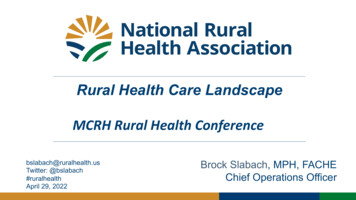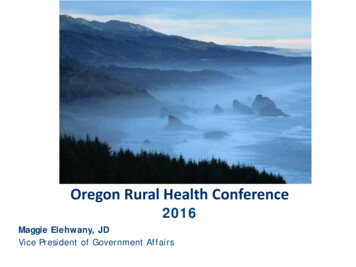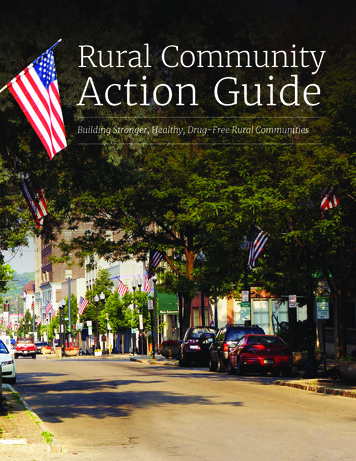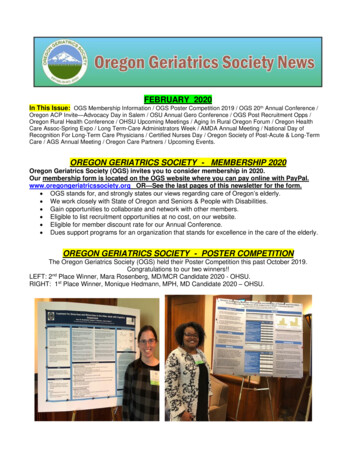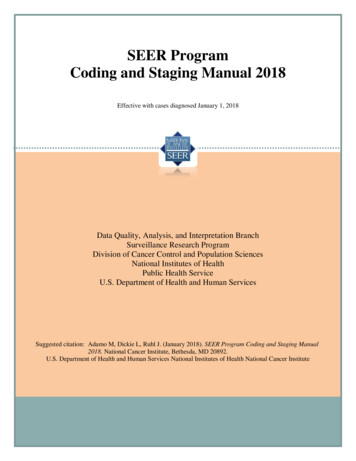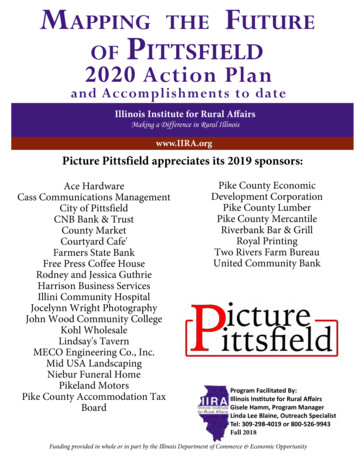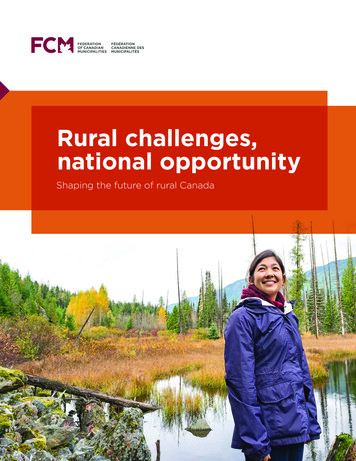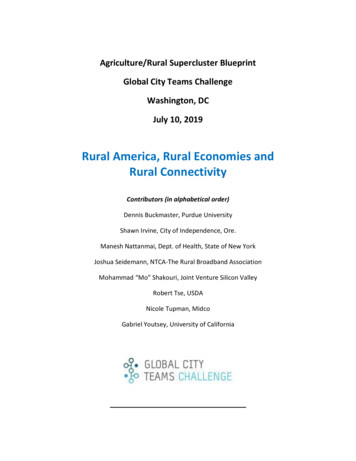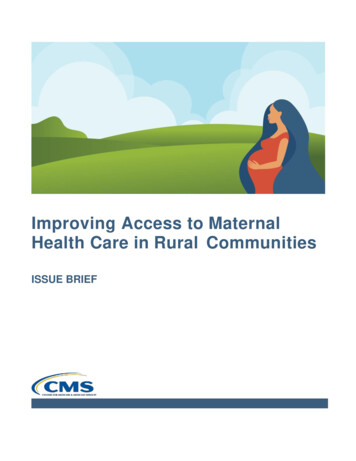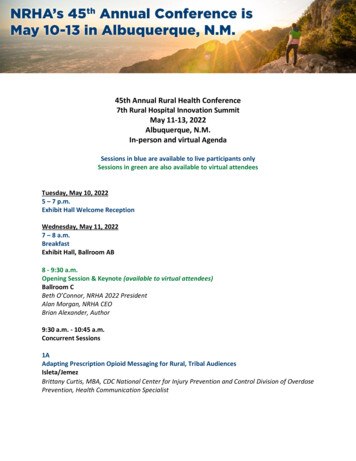
Transcription
45th Annual Rural Health Conference7th Rural Hospital Innovation SummitMay 11-13, 2022Albuquerque, N.M.In-person and virtual AgendaSessions in blue are available to live participants onlySessions in green are also available to virtual attendeesTuesday, May 10, 20225 – 7 p.m.Exhibit Hall Welcome ReceptionWednesday, May 11, 20227 – 8 a.m.BreakfastExhibit Hall, Ballroom AB8 - 9:30 a.m.Opening Session & Keynote (available to virtual attendees)Ballroom CBeth O’Connor, NRHA 2022 PresidentAlan Morgan, NRHA CEOBrian Alexander, Author9:30 a.m. - 10:45 a.m.Concurrent Sessions1AAdapting Prescription Opioid Messaging for Rural, Tribal AudiencesIsleta/JemezBrittany Curtis, MBA, CDC National Center for Injury Prevention and Control Division of OverdosePrevention, Health Communication Specialist
The Centers for Disease Control and Prevention will share insights discovered throughformative research and in-depth interviews related to cultural sensitivities and communicationstrategies for addressing opioid use disorder, misuse, addiction, and recovery with theAmerican Indian/Alaska Native community.The Intersection of Rural Opioid Misuse and TraumaMichael Meit, MA, MPH, East Tennessee State University Center for Rural Health ResearchDirector of Research and ProgramsMegan Quinn, DrPH, East Tennessee State University College of Public Health AssociateProfessorOpioid misuse negatively impacts rural communities. Adverse childhood experiences increaserisk for opioid-related harms, raising the potential for targeted strategies to mitigate bothissues. This session will describe this relationship, including trends in opioid-related harms.Evidence-based strategies to promote resiliency and address trauma in rural communities willbe discussed.1BModernizing the Rural Health Clinic ProgramCochitiJohn Gale, MS, University of Southern Maine Rural Health Research Center Senior ResearchAssociate and Director of Policy EngagementThe Rural Health Clinic Program, established in 1977, pioneered new approaches to providingand paying for primary care. The program would benefit from updating to better serve ruralcommunities. This session explores opportunities to modernize the RHC Program by building onits foundation of rural-relevant payment reform and team-based care.1CCombatting Obesity and Chronic Disease in Rural AmericaApacheJennifer Conner, DrPH, MPH, MAP, Delta Population Health Institute Director of Research andNew York Institute of Technology College of Osteopathic Medicine at Arkansas State UniversityAssociate ProfessorJason Lofton, MD, Howard Memorial Hospital Family Practice Physician and Rural CommunityObesity AdvocateCarrie Thielen, MPH, RD, Presbyterian Healthcare Services Manager of Regional CommunityHealthAnna Huff-Davis, Arkansas Community Health Worker Association ChairAlva Ferdinand, PhD, MPH, Southwest Rural Health Research Center Director and Texas A&MSchool of Public Health Assistant ProfessorMary-Katherine McNatt, DrPH, MPH, MCHES, CPH, COI, A.T. Still University College of GraduateHealth Studies Department of Public Health Chair and Associate ProfessorJosefina Mata, MS, MPH, MBA, Concilio Campesino de Sudoeste, Inc. Executive Director2
Rural Americans face a unique combination of factors that create disparities in health care notfound in urban areas. With rural residents at a greater risk of being obese, special attentionmust be directed towards mitigating the factors which contribute to obesity and associatedcomorbidities. This session intends to highlight the need to address obesity and chronicconditions in rural areas and address policy issues and solutions.1DNRHA Fellows Explore Mental Health in Rural Areas (available to virtual attendees)TaosHeather Whetsell, MBA MSHI, SIU Medicine Population Science & Policy Administrative DirectorJanessa Graves, PhD, MPH, Washington State University Associate Professor of NursingBrenda Mack, DSW, MSW, LICSW, Bemidji State University Assistant Professor of SocialWork/Director of Field Education/SOWK Club AdvisorMental Health in rural areas is a crisis. The 2021 NRHA Rural Health Fellows mental healthworkgroup has explored challenges and barriers to mental health care in rural areas includingaccess to care; workforce recruitment and retention; lack of broadband; and telepsychiatry.This session will explore their findings and recommendations.1EGot Rural Docs? How Osteopathic Schools Do ItSanto DomingoDavis Patterson, PhD, University of Washington School of Medicine WWAMI Rural HealthResearch Center Research Associate ProfessorRussell Maier, MD, FAAFP, Pacific Northwest University College of Osteopathic MedicineAssociate Dean for Graduate Medical EducationDana Shaffer, DO, FACOFP dist., FA, University of Pikeville Kentucky College of OsteopathicMedicine Dean (retired)Osteopathic medical schools excel at producing rural physicians. Learn from leaders at PacificNorthwest University and University of Pikeville Kentucky Colleges of Osteopathic Medicineabout successful strategies they use to recruit and educate medical students who will chooserural practice, based on data from the WWAMI Rural Health Research Center.1FContemporary Uranium Exposure in Navajo Nation/Southwestern StatesNavajo/NambeJohnnye Lewis, PhD, University of New Mexico College of Pharmacy Health Sciences CenterResearch Professor and Community Environmental Health Program DirectorDebra MacKenzie, PhD, University of New Mexico College of Pharmacy Health Sciences CenterAssistant Professor3
Denise Bartley, PhD, MSN, FNP-BC, Navajo Area Radiation Exposure Screening and EducationProgram (RESEP) Program DirectorThe Radiation Exposure Screening and Education Program (RESEP) and Radiation ExposureCompensation Act (RECA) have worked in tandem for two decades to serve individualsimpacted by Cold War era nuclear weapons development. Now that RECA is planned to sunsetin 2022, the persistent environmental health issue of contemporary uranium exposure in thesouthwestern US runs the risk of falling entirely into obscurity.RHIS – APM Track340B ACOs Improved Patient Outcomes (available to virtual attendees)Picuris/SandiaLynn Barr, MPH, Caravan Health Founder and Executive ChairwomanSafety net providers can thrive in accountable care, and now they can unlock more revenuepotential and improve patient care. ACO participants have a view into their patients’ care andprescription history. In this session, hear directly from rural health leaders about successes andbest practices of succeeding with accountable care and 340B.RHIS -- OperationsHow to Attract, Recruit, and Retain Great EmployeesSanta AnaSteve Anderson, PhD, Integrated Leadership Systems PresidentAngelia Foster, Marshfield Medical Center Chief Administrative OfficerAttracting and keeping talented employees is a critical activity of any successful health careorganization. This session will discuss the components of creating a culture that empowersemployees and attracts the best talent, as well as how to deal with employees that harm yourculture of excellence.1GContributed Research Papers – COVID-19Laguna Addressing COVID-19 Concerns in Amish CountryMelissa K. Thomas, PhD, MSA, MSPH, Ohio University Heritage College of Osteopathic MedicineAssistant ProfessorRural COVID-19 Mortality Disparities, December 2020-January 2021Whitney Zahnd, PhD, University of Iowa Assistant ProfessorCommunity-engaged research promoting COVID-19 vaccination in MontanaAlexandria Albers, MS, University of Montana Graduate Research AssistantSurveying rural healthcare workers for vaccine hesitancy concernsDaniel Tellez, University of Arizona College of Pharmacy Student and Mariposa CommunityHealth Center Pharmacy Intern; Adrian Acuna, University of Arizona College of Pharmacy Studentand Pima County Joint Technical Education District Skills Instructor; Jose Bustamante, University4
of Arizona College of Pharmacy Student; Elizabeth Hall-Lipsy, JD, MPH, University of ArizonaCollege of Pharmacy Assistant Professor10:45 – 11:00 a.m.Poster Session/BreakLa Sala Foyer11:00 a.m. – 12:15 p.m.Plenary Session – HRSA Rural Health Update (available to virtual attendees)Ballroom CTom Morris, Federal Office of Rural Health Policy Associate AdministratorThis session will provide updates regarding key federal activities that help improve access toquality health care in rural communities.12:15 p.m. – 2:30 p.m.LunchExhibit Hall, Ballroom AB1:00 — 2:00 p.m.Welcome to the Revolution: Reimagining Rural Health MarketingBallroom CMike Milligan, Legato Healthcare Marketing PresidentAmy Yaeger, Legato Healthcare Marketing Vice President Strategic ServicesA new era of rural healthcare marketing is here, and your organization needs to make use ofthese tools now – or be left behind. This presentation will focus on the evolution of digitaladvertising, including streaming, PPC, SEM, email campaigns, social media, websites, blogs,reputation management, patient reviews and EHR communication – all of which allow ruralhealthcare leaders to build relationships with their current and future patients. LegatoHealthcare Marketing’s President Mike Milligan and Vice President of Strategic Services AmyYaeger will discuss how to transform your organization’s marketing plan to meet today’sconsumers on their terms – while also maximizing your return. After attending this session,instead of saying, “I didn’t know we could do that!” your team will be able to say, “We’ve gotthis!”1:30 – 5:00 p.m.Student Track Session/Student Constituency Group MeetingZuniJoin other students for an interactive rural ethics session and the student constituency meeting.2:30 – 3:45 p.m.5
Concurrent Sessions2AThe Intersection of Oral and Behavioral Health – Can We Meet in the Middle?Isleta/JemezLaura McKeane, EFDA, AllCare Health Director of Oral Health IntegrationKelli Beaumont, EPDH, Capitol Dental Care Dental HygienistCan oral and behavioral health come together to meet people where they are? In ruralSouthern Oregon, access to both is challenging. So, this organization decided to tackle it headon and integrate oral health in a behavioral/physical health setting. This session will look at thesuccesses as well as lessons learned.2BGeographic and Ethnic disparities among U.S. border residentsCochitiJanice C. Probst, PhD, University of South Carolina Arnold School of Public Health DistinguishedProfessor Emerita hjhjkjhjhkjkElizabeth Crouch, PhD, University of South Carolina Arnold School of Public Health AssistantProfessor and Rural and Minority Health Research Center Deputy DirectorMary-Katherine McNatt, DrPH, MPH, MCHES, CPH, COI, A.T. Still University College of GraduateHealth Studies Department of Public Health Chair and Associate ProfessorThis session will present findings from the 2021 Rural Border Health Chartbook, which presentsa variety of health indicators and social determinants of health that have previously beenidentified as disparities warranting programmatic and policy interventions. Our findings will beuseful for educating public health officials, policymakers, and other organizations.2CCapital Planning: Rural Foundations to FinancingApacheJonathan Chapman, MBA, Capital Link Chief Project OfficerJennifer Williams, FQHC Resource Alternative CEOKatie Parnell, CommuniHealth Services CEOThis presentation will examine the capital expansion planning process, highlighting ruralprojects and their firsthand experiences and challenges. The presentation will also reviewvarious capital project financing options available to health centers including conventional bankand USDA loans as well as sources such as new markets tax credits.2DSpreading Knowledge, Not COVID: Rural NC Latino/Hispanic AmbassadorsNavajo/Nambe6
Hannah Robinson, MPH, Partners Aligned Toward Health Healthy Lifestyles Program ManagerSchell McCall, Partners Aligned Toward Health Executive DirectorSarah Thach, MPH, UNC Gillings School of Global Public Health Assistant Professor and Masterof Public Health Program in Asheville Assistant DirectorLaCosta Tipton, MPH, BSN, RN, Mountain Community Health Partnership Director of OperationsAmber Dillinger, MHA, Mountain Community Health Partnership Outreach ManagerMolly Martinez, BS, Community Ambassador Real Equality (CARE) Community AmbassadorIn the fall of 2020, 12 bilingual rural North Carolina Latinx residents were recruited to createand share culturally responsive and relevant COVID-19 messaging, using the evidence-basedBoot Camp Translation model adapted for the rapidly evolving pandemic. Participantsdisseminated messages and reported changed beliefs and are now addressing new communityhealth concerns.2ELiving Rurally with Long-Term Conditions Through COVID-19Santo DomingoSarah-Anne Munoz, PhD, University of the Highlands and Islands ProfessorWhitney Zahnd, PhD, University of Iowa Assistant ProfessorSteve Bain, DMin, Texas A&M University-Kingsville Professor and DeanThis session brings evidence from the USA and the UK on the experience of living rurally with along-term condition (physical or mental) during COVID-19. Presenters will discuss the impact ofthe pandemic on rural residents with a long-term condition and their family and careers, as wellas consider how support could be strengthened.2FFORHP Medicare Policy Update (available to virtual attendees)Picuris/SandiaKerri Cornejo, MPH, Health Resources and Services Administration Federal Office of Rural HealthPolicy Policy CoordinatorDarci L. Graves, MPP, MA, MA, Centers for Medicare and Medicaid Services Office of MinorityHealth Program Alignment and Partner Engagement Group Acting Technical Advisor andCenters for Medicare and Medicaid Services Rural Health Council Co-chairEmily Cook, JD, MSPH, McDermott Will & Emery, LLP PartnerThis session will provide participants with an overview of recent Medicare policies andregulations that affect rural clinicians and health care facilities including changes related toservices, billing, and quality reporting. Participants will learn about recent legislative changesaffecting rural health care and CMS’s recent or upcoming proposed policy changes. Participantswill also hear about policy and research activities and resources from the Federal Office of RuralHealth Policy.RHIS – APM Track7
Community Engagement and Planning for Rural Health SystemsSanta AnaJohn Gale, MS, University of Southern Maine Rural Health Research Center Senior ResearchAssociate and Director of Policy EngagementRural hospital closures are driven, in part, by comparatively low utilization of local services. Toremain viable, rural systems of care must have the active support of their communities. Thissession explores a framework to conduct community health planning and engagement to buildrobust, sustainable systems of rural health services.RHIS -- OperationsSwing Bed Quality Certification, One Year Later (available to virtual attendees)TaosKate Hill, RN, The Compliance Team, Inc, VP Clinic DivisionLeslie Marsh, Lexington Regional Medical Center CEOJonathan Pantenburg, MHA, Stroudwater Associates PrincipalBrittany Hueftle, BSN-RN, Lexington Regional Health Center Director of Transitional Services andPatient Care CoordinatorThis lecture will highlight the benefits of achieving swing bed quality certification. Listen to anexperienced CEO tell the swing bed quality story and the benefits to the hospital, along with thesteps to take to achieve this distinction.2GContributed Research Papers – Rural Maternal HealthLaguna A Retrospective Exploration of Rural Maternal-Infant DisparitiesMelissa White, DrPH(c), MPH, MS, East Tennessee State University Graduate Research AssistantRacial inequities in postpartum health insurance among rural and urban US residentsJulia Interrante, MPH, University of Minnesota Rural Health Research Center Doctoral StudentStructured Training for the Rural EnhancemenT of Community Health in Obstetrics: STRETCHOBKaren Liao, MD, University of Illinois College of Medicine Rockford Family Medicine Physician,Clinical Assistant Professor, and Associate Program Director3:45 – 4:00 p.mPoster Session/BreakLa Sala Foyer4:00 – 5:15 p.m.Concurrent Sessions3AThe Rural American Cancer Experience8
Isleta/JimezWade Swenson, MD, MPH, Lake Region Healthcare Medical DirectorEmily Westergard, BA, DO, Gundersen Health System Hematology and Oncology Fellow, PGY-4This session summarizes the collective experiences and unique needs of rural American cancerpatients described in recent medical literature and incorporates the experience of a ruralcancer center. The summary focuses on interventions and opportunities to improve ruralcancer care delivery.3BPreparing RHCs and FQHCs for Value-Based Care (available to virtual attendees)Picuris/SandiaJohn Gale, MS, University of Southern Maine Rural Health Research Center Senior ResearchAssociate and Director of Policy EngagementGrowth in value-based care requires rural health clinics to adapt to payment programs thatemphasize primary care, preventive services, care coordination, disease management,population health, information sharing, and quality reporting. This session describes tools andcare models to prepare RHCs for changes in the evolving rural health care marketplace.3CUnderstanding and Assessing Rural Recovery EcosystemsApacheMichael Meit, East Tennessee State University Center for Rural Health Research Director ofResearch and ProgramsRobert Pack, PhD, East Tennessee State University College of Public Health Professor &Associate DeanErnie Fletcher, MD, Fletcher Group Co-Founder and Chief Medical OfficerAndrew Howard, Fletcher Group Director of PolicyRecovery ecosystems provide an environment where individuals can access substance usetreatment and recovery support services such as housing and second chance employment. Thissession will highlight factors present in strong rural recovery ecosystems, recovery ecosystemsupports implemented in eastern Kentucky, and initial development of a rural recoveryecosystem index.3DCommunity Engagement Developing Recovery Housing in Rural CommunitiesCochitiJanice Fulkerson, Fletcher Group Rural Center of Excellence COONate Conklin, Fletcher Group Rural Center of Excellence Outreach & Engagement SpecialistAngie Gribble, BS, MHS, St. Luke’s Health System Senior Director of Community Health9
Recovery housing provides services to individuals with substance use disorder who alsoexperience homelessness, criminal justice involvement, and high health care utilization. Ruralcommunity health, human services, corrections, and other stakeholders are crucial to establishrecovery housing in rural communities. This case study presents a collaboration for a ruralcommunity.Rural Housing SolutionsKay Miller Temple, MD, Rural Health Information Hub Web WriterJana Reese, Rural Health Information Hub Funding Resources SpecialistShonterria Charleston, Housing Assistance Council Training and Technical Assistance DirectorAmanda Reddy, National Center for Healthy Housing Executive DirectorSpecifically connected to certain medical conditions, intuitively associated with populationhealth and well-being, and indelibly linked to a rural community’s economics and health caredelivery, housing is an important social determinant of health. This panel will describe housingneeds and highlight a range of rural funding options to meet housing needs.3EDevelopment of a Statewide, AHEC-Administered Pre-med Prep ProjectSanto DomingoDavid Gross, Northeast Kentucky Area Health Education Center DirectorCatherine Malin, South Central Kentucky Area Health Education Center DirectorBrenda Fitzpatrick, Northwest Kentucky Area Health Education Center DirectorRural Kentucky has a longstanding shortage of physicians. In response, the Northeast KentuckyArea Health Education Center developed a pre-medicine preparatory program that has beenreplicated in seven other regional centers. This session will explain the development of thisproject, from securing state funding to cross-center collaboration to data tracking.3FRural Emergency Hospitals 101: What You Should KnowNavajo/NambeEmily Jane Cook, JD, MSPH, McDermott Will & Emery, LLP PartnerMargaret Greenwood-Ericksen, MD, MSc, University of New Mexico Professor of EmergencyMedicineGeorge H Pink, PhD, North Carolina Rural Health Research Program Deputy DirectorPat Schou, MS, FACHE, Illinois Critical Access Hospital Network Executive DirectorSarah Young, MPH, Federal Office of Rural Health Policy Policy Research Division DeputyDirectorThe Consolidated Appropriations Act of 2021 (P.L. 116-260) established a new provider type,the Rural Emergency Hospital (REH), to allow certain small rural hospitals to transition to REHdesignation to provide necessary emergency and outpatient health care services as an10
alternative to a hospital closure. The first date for a hospital to transition to an REH is January 1,2023. This is a major milestone since there has not been a new, permanent rural provider typeestablished in statute since the creation of the Critical Access Hospital designation in 1997. Thissession will cover perspectives from rural legal and policy experts, rural health researchers, andrural health stakeholders on the National Advisory Committee for Rural Health and HumanServices. Session attendees will learn about the law creating REHs, the rulemaking process andconsiderations for designing the REH program, how rural stakeholders can prepare for thechange, and potential impacts of this new provider type on the rural health care landscape.RHIS – APM TrackPaving a Path for the Future in 340B (available to virtual attendees)TaosLisa Scholz, PharmD, MBA, FACHE, Sentry Data Systems Head of Industry RelationsIn 2020, we will forever remember the pandemic. Another storm was brewing related to 340B.In July 2020, the first manufacturer announced they would stop selling 340B drugs to coveredentities’ contract pharmacies. The question on everyone’s mind: “What will be the best strategyand path forward?”RHIS -- OperationsSanta Ana3GContributed Research Papers – Substance AbuseLaguna Community Perspectives on Opioid Misuse in Rural AmericaCarlin Rafie, PhD, MS, RD, Virginia Tech/Virginia Cooperative Extension Assistant ProfessorSBIRT Diffusion in Rural vs. Urban Healthcare SettingsAngela Hagaman, DrPH, MA, NCC, ETSU NORC Rural Health Equity Research Center (RHERC)Research Operations DirectorRural WV Responds to Opioid Injection EpidemicsDrema Hill, PhD, MSP, WV School of Osteopathic Medicine Vice President for CommunityEngagement and DevelopmentSexual Health EBI Impact on Substance Use Among Native YouthLauren Tingey, PhD, MPH, MSW, Johns Hopkins Center for American Indian Health AssociateDirector; Laura Pinal, Johns Hopkins Center for American Indian Health Research AssistantThursday, May 12, 20228- 9 a.m.Constituency Group Meetings and Continental BreakfastPublic Health Status/Clinical CG Meeting Isleta/JemezFQHC CG Meeting Santa AnaResearch & Education/Journal of Rural Health Santo DomingoFrontier/RHC Laguna11
State Association Council ApacheStatewide Health Resources/NOSORH CochitiHospital Taos9:00 – 10:15 a.m.Concurrent Sessions4ATBA4BHow Telemedicine Answers the Call in Rural Health CareNavajo/NambeKelly Rhone, MD, FACEP, Avel eCare Medical Director of Outreach and InnovationMandy Bell, MHA, Avel eCare Vice President of Product InnovationThe COVID-19 pandemic caused a rapid adoption of telemedicine. Layering telemedicine intocurrent processes allowed a weary workforce to provide care during the surge. How cantelemedicine remain a critical part of health care delivery as we learn to live in a world wherepandemics may be more common?4CRural Libraries as Innovative Partners in Increasing Access to Health CareApacheMegan Weis, DrPH, MCHES, SC Center for Rural and Primary Healthcare Director of CommunityEngagementAlanti McGill, MPH, SC Center for Rural and Primary Healthcare Program ManagerThe South Carolina Center for Rural and Primary Healthcare’s Rural Libraries and HealthInnovations Program supports library systems as community health hubs. This presentationprovides an overview of the program and learning collaborative and highlights different models,strategies, successes, and lessons learned.4DTogether With Veterans for Rural Veterans Suicide PreventionSanto DomingoLeah Wendleton, MPH, MSW, Rocky Mountain MIRECC for Suicide Prevention Health ScienceSpecialistJason Alves, MPA, Western Interstate Commission for Higher Education Director of VeteransInitiativesSarah Jordan, MA, Western Interstate Commission for Higher Education Program Manager forTogether with VeteransRachel Johnson, PhD, LCSW, University of Colorado College of Nursing Assistant Professor12
Nathaniel Mohatt, PhD, Rocky Mountain MIRECC for Suicide Prevention CommunityPsychologistThe Together With Veterans (TWV) is a community-based suicide prevention program for ruralveterans. TWV involved partnering with rural veterans and community partners to implementpublic health strategies. This session will provide an overview of the program, lessons learnedfrom implementing in more than thirty communities, and future program directions.4ENurse Practitioner Residencies and Fellowships Promote Rural Practice (available to virtualattendees)TaosLouise Kaplan, PhD, ARNP, FAAN, Washington State University Associate ProfessorMykell Barnacle, DNP, FNP-BC, North Dakota State University NP Residency Program DirectorJohanna Stiesmeyer, DNP, MS, RN, NPD-BC, Presbyterian Healthcare Services System Director ofClinical Education and Professional Development and HRSA Advanced Nursing Education NursePractitioner Residency Principle InvestigatorGregory Rys, DNP, Bassett Health Care Network Director of the Bassett Health Care FamilyNurse Practitioner Rural Residency ProgramRural postgraduate nurse practitioner (NP) residencies and fellowships support recruitment andretention of NPs to rural primary care practice. This expert panel will review results of a studyon rural NP program models and factors that influence their success, followed by discussionwith attendees about how to expand programs further.Grow Your Own APRNs and Keep Them Forever (available to virtual attendees)Callie Anne Bittner, MS, RN, Colorado Center for Nursing Excellence Project DirectorIngrid Johnson, DNP, MPP, RN, Colorado Center for Nursing Excellence President and CEOBuilding on several years of successful “grow your own” recruitment and retention strategies,this program was developed with grant funding to support nurse practitioners in Colorado toreturn to school and obtain a post-graduate psychiatric nurse practitioner certificate in ruralprovider shortage areas, increasing access by up to 25 percent.4FCOVID-19 Health Equity Grants – the Role of State Offices of Rural HealthSanta AnaMichael Meit, East Tennessee State University Center for Rural Health Research Director ofResearch and ProgramsLisa Davis, Pennsylvania Office of Rural Health DirectorRobert Duehmig, Oregon Office of Rural Health Interim DirectorKirby Lecy, Massachusetts Office of Rural Health Rural Health Project Coordinator13
This session will explain how different State Offices of Rural Health are leveraging rural carveout funding from federal grants to address health disparities that arose during the COVID-19pandemic.RHIS – APM TrackSmall Rural Hospital Blueprint for Performance Excellence and Value (available to virtualattendees)Picuris/SandiaTerry Hill, MPA, National Rural Health Resource Center Senior Advisor for Rural HealthLeadership and PolicyPeggy Wheeler, MPH, California Hospital Association Vice President of the Rural HealthcareCenterMaggie Sauer, North Carolina Department of Health and Human Services Office of Rural HealthDirectorThe Blueprint for Performance Excellence and Value identifies the most important criticalsuccess factors for small rural hospitals to achieve excellence. A summit with rural hospitalleaders supported by the Federal Office of Rural Health Policy updated the Blueprint andconfirmed the Blueprint offering examples, along with lessons learned and opportunities.RHIS – OperationsLeveraging Partnerships to Score A WINN for RuralCochitiNicole Weathers, MSN, RN, Iowa Online Nurse Residency Program Program ManagerTondeleyo Gonzalez, Colorado Center for Nursing Excellence Assistant Project DirectorIncreases in retirement and nurses transitioning away from the bedside left vacancies thatacademic institutions push to fill with new graduates. Eligible candidates prioritize ongoingtraining and mentorship, challenging rural organizations where nurse residencies are scarce.Leveraging partnerships allowed for development of the Workforce Innovation NursingNetwork serving rural facilities.4GContributed Research Papers – Rural vs Urban TrendsLaguna Addressing Geographic Disparities in the Provision of Ambulance ServicesYvonne Jonk, PhD, University of Southern Maine Associate Research ProfessorMaternal Morbidity Risk across Rurality, Race, and MedicaidJulia Interrante, MPH, University of Minnesota Rural Health Research Center Doctoral StudentEvaluation of Rural Inclusion in State Plans on AgingCarrie Henning-Smith, PhD, MPH, MSW, University of Minnesota School of Public HealthAssociate ProfessorRural-Urban Disparities in Inpatient Psychiatric Care Quality14
Peiyin Hung, PhD, MSPH, University of South Carolina Rural and Minority Health Research CenterAssistant Professor10:15 – 10:45 a.m.Poster Session/BreakLa Sala Foyer10:45 a.m. – 12:00 p.m.Concurrent Sessions5AHISP Programs Reduce Cardiovascular Disease Risk in RuralIsleta/JemezKatherine Lloyd, MPH, Federal Office of Rural Health Policy Public Health AnalystManorama Khare, PhD, MS, University of Illinois College of Medicine Rockford ResearchAssociate ProfessorDonna Norkoli, BS, NCHES, District Health Department #10 Health PlannerAmanda Phillips Martinez, MPH, Georgia Health Policy Center Assistant Project DirectorThe Federal Office of Rural Health Policy’s outreach program, funded by the HealthImprovement Special Project, was created to addr
The Rural Health Clinic Program, established in 1977, pioneered new approaches to providing and paying for primary care. The program would benefit from updating to better serve rural communities. This session explores opportunities to modernize the RHC Program by building on its foundation of rural-relevant payment reform and team-based care. 1C
